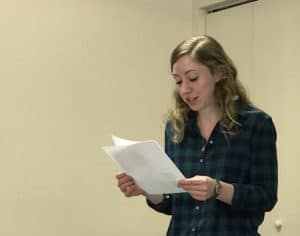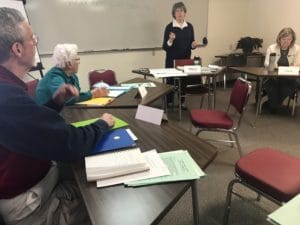by Tracy Rittmueller
news@thenewsleaders.com
This April, St. Joseph students, teachers, merchants, readers and, of course, poets are encouraging everyone to notice poetry’s important place in our culture and our lives. National Poetry Month, founded and sponsored by the Academy of American Poets, is celebrating its 22nd year and St. Joseph is joining the world’s largest literary event.
The Local Blend is inviting people to come to its open mic every Tuesday starting at 7:30 p.m. to read and listen to poetry. And on Wednesday, April 26, “National Poem in Your Pocket Day,” Minnesota Street Market wants everyone to stop by to pick up free poems by local and national poets.
But poetry in St. Joseph is not only an April activity. This past February and March, on four Saturday mornings, 11 people gathered at the Spirituality Center of St. Benedict’s Monastery to discuss and do the work of poetry. Mara Faulkner, OSB, designed and facilitated the workshop for participants who came from as near as in town and as far as 40 miles south of Minneapolis.
Some had been reading and writing poetry for decades. For others, this was their first exploration of what poetry is and what it can accomplish. At the first meeting, when Faulkner asked them to describe their current relationship with poetry, answers varied as much as their ages, ranging from 28 to 86.
“I don’t know anything about poetry,” said Mary Downs, a retired business person and current freelance writer.
David Walters, a retired pastor, said, “Reading and writing poetry is one of my great passions.” He wrote poetry in his youth and took it up again after he retired as a pastor. He came to the workshop hoping to become a better poet.
“Poetry is music,” said Caitlin Brutger. She lives in St. Joseph and teaches piano at the Wirth Center for the Performing Arts.
Faulkner named this learning opportunity “Caution: Poetry at Work,” as if to remind everyone to slow down and pay attention. Be careful because you’re entering a danger zone, but proceed anyway.
“Poets try to express the inexpressible,” Faulkner told the participants.
She explained poetry takes abstract ideas like poverty, love, heroism and grief and moves them into the concrete, sensory world. Senses are the gateway to emotions. And when people feel deeply, they are moved to act.
Poetry can work people up, work them over, work as an agent of change. But it doesn’t work at all if people exclude poetry from their lives. Those who attended Faulkner’s workshop took a risk. They opened themselves to poetry and to each other to see what would happen.
“I found an appreciation for the world of poetry,” said Downs, the woman who hadn’t known anything about it.
“I had never tried writing poetry, it was something I listened to,” said pianist Brutger. “Listening to poets give talks or listening to music [lyrics] was passive. This workshop took me into the creative writing exercise and made poetry more active.”
In one exercise, Faulkner suggested they use the words “prairie sage, blues in the night, Harley Davidson, orphan and velvet.” From that list, Brutger crafted this poem:
IN THE BEGINNING
In the beginning
there was only the prairie sage.
No orphan railroad tracks
abandoned and rusted.
No shriek of car keys
in a Harley Davidson
leaving a scratch on a dusty back road.
In the beginning
“blues in the night” meant the call of the birds,
the chirping of the crickets,
the winds in the grass –
an orchestra of nature
without meter to abide.
Velvet was the midnight sky,
deep black, soft & embracing.
There was only the prairie sage
in the beginning.
Workshop participants told Brutger she has a natural talent.
“[Before this] my biggest interaction with poetry was through music,” she said. “I play piano with Mike Opitz, professor at St. Ben’s, who puts poems to music. We’re currently working on an Emily Dickinson poem, and we did an excerpt from a book by Murakami called ‘1Q84.’”
She said writing poetry has been a fun discovery, giving her another creative outlet different from other writing or music.
“I’m definitely going to keep writing poems,” she said.
Brutger is contributing a poem to Minnesota Street Market’s National “Poem in Your Pocket Day” project, as are other local poets Charles Wm. Preble, Mara Faulkner and Larry Schug.
Faulkner said poets pay attention to the natural world, to smells, sensations, sights, sounds and tastes — even the unpleasant ones. They make room for all their emotions.
Writing from the many prompts Faulkner supplied, workshop participants explored regret and forgiveness, the comforting beauty of nature, refracting light and the individuality of people’s perceptions of color. They wrote about loneliness, friendship and self-acceptance, about the environment and love and loss. They shared their writing with one another and they responded carefully with kindness.
They spent 12 hours together discussing the work of poetry, generating poems and they came to see one another as unique, gifted, astonishing humans, each with important things to tell the world. The connections they formed were important enough that many of them, including Brutger, plan to get together on a regular basis.
There is a perception a poet writes alone. While that’s often true, poetry is a human art, and like humanity, it needs partnerships and collaborations. So they partnered up. The first person wrote a few lines and stopped. Then the second person added a few more lines. Through emails, they passed words back and forth until they agreed the poem was complete.
The following verse is from a partner poem by David Walters and Dave Larson, a retired orthopedic surgeon who had never written poetry before attending the workshop in St. Joseph.
DIALOGUE BETWEEN TWO POETS
Winter’s frozen nights lose their lonely howl
As we gather ’round warm fires in community,
Wisdom falls on us like soft cleansing snow now,
birthing children whose cries awaken generosity.
At the group’s last meeting, March 17, Faulkner said in the face of major difficulties and challenges — injustices, corruption, needless death and destruction — humans have an obligation to speak up, to witness and testify, to call for something better.
“Cry out the truth as if you have a million tongues. It’s silence that kills the world,” she said, quoting 14th century philosopher and theologian, Catherine of Siena. “Of course, as a Benedictine, I also love silence.”
There is more than one kind of silence. The keeping of secrets and covering crimes can be suffocating and deadly, and yet there is a silence St. Joseph poet Charles Wm. Preble says is essential to poetry and to music.
“The contemplative and poetic stance is silence,” Preble said recently at The Local Blend while drinking coffee and discussing poetry. “Behold, says the poet! Behold is a word that startles like a magician. To behold is to be still, observe, be held.”
He explained writing or reading a poem is sometimes akin to birdwatching or enjoying a sunset. It comes from and leads to an inner stillness.
So, do poets enter silence or do they break silence?
Poets takes us into the uneasy realms of paradox and ambiguity, where opposite things can be simultaneously true, where there are no simple answers. In poetry, contradictory emotions exist together with important questions about what we should do when powerful feelings arise.
Poetry asks us to dive deeply into experience: to mourn, lament and rage; to love and rejoice in ecstasy; to ponder, brood, wonder and awe. Poetry challenges us to welcome and embrace our full humanity in our private and public lives.
April is National Poetry Month. The Academy of American Poets, along with the poets of St. Joseph and poets of surrounding central Minnesota towns, are asking everyone to notice poetry and explore the remarkable work it can do. They want people to know poetry possesses the unique power to express the inexpressible. Poetry can paint the full range of human experience with all its joy and sorrow, solemnity and silliness. The poets who participated in the recent workshop concluded one of the many things poetry does is to astonish us into awareness, helping us to be more fully alive.






